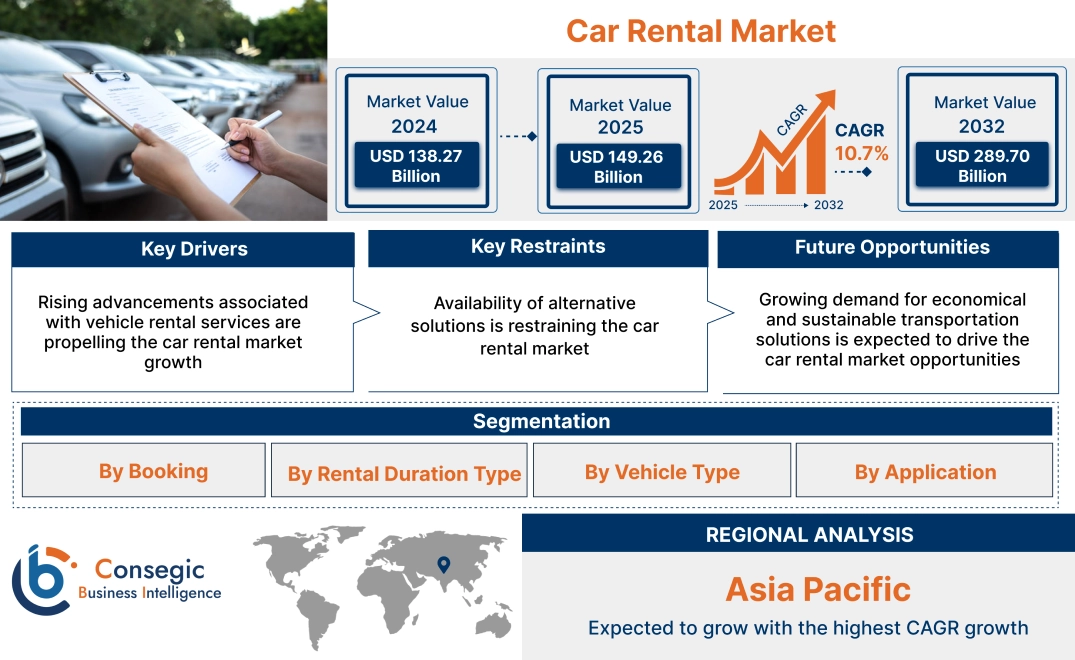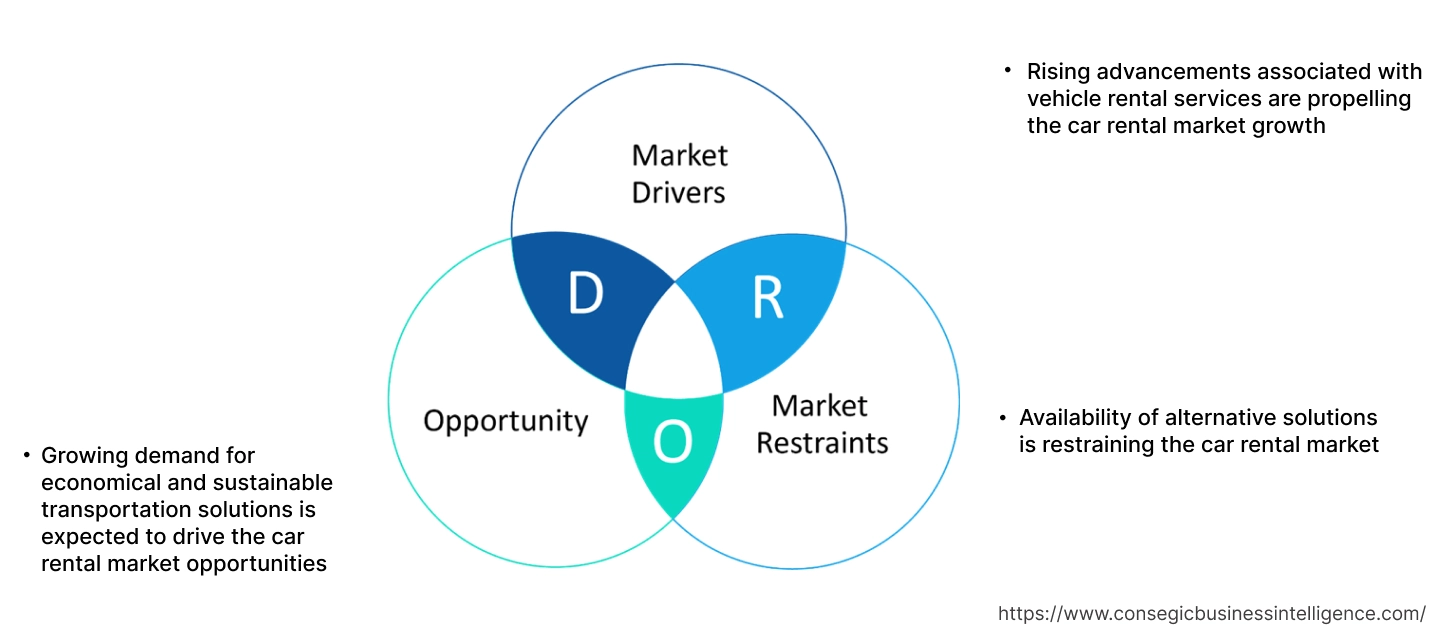- Summary
- Table Of Content
- Methodology
Car Rental Market Size:
Car Rental Market size is estimated to reach over USD 289.70 Billion by 2032 from a value of USD 138.27 Billion in 2024 and is projected to grow by USD 149.26 Billion in 2025, growing at a CAGR of 10.7% from 2025 to 2032.
Car Rental Market Scope & Overview:
A car rental service refers to a business that offers several types of cars for temporary use by customers. Car renting services usually enable individuals or businesses to rent cars for short-term periods, ranging from a few hours to several days or longer. Moreover, several types of vehicles such as luxury cars, executive cars, economy cars, sports utility vehicle (SUVs), and multi utility vehicle (MUVs) are often utilized for rental purpose. In addition, renting cars provide a range of benefits such as route flexibility, increase comfort and convenience, cost savings, and others.
Key Drivers:
Rising advancements associated with vehicle rental services are propelling the car rental market growth
Car renting service providers are frequently investing in the acquisition of advanced cars along with improved car renting service offerings to ensure its safe and effective utilization for short-term and long-term rental usage. As a result, car renting service providers are launching new car renting service offerings with updated features for increased user convenience and comfort, which in turn is driving the market.
- For instance, in December 2024, Zoomcar Holdings Inc. launched Zoomcar Cabs in Bengaluru, India, which provides commercial cars with professional drivers for rental at ideal prices. The company’s extension from self-drive offerings to chauffeur-driven services aims at diversifying its service offerings and improving customer experiences.
Therefore, the rising advancements associated with car renting services are proliferating the car rental market size.
Key Restraints:
Availability of alternative solutions is restraining the car rental market
There are several alternative solutions to renting cars including motorbike or scooter rentals, and others. Moreover, the alternative solutions have similar benefits and applications in comparison to renting cars, which is a key factor restricting the market.
For instance, several consumers often prefer renting motorbikes and scooters in comparison to renting cars as bike/scooter rentals are typically available at a much lower costs than car rents, making them an ideal option for budget-conscious travelers, particularly for short trips. Hence, the availability of several alternative solutions to renting cars is hindering the car rental market expansion.
Future Opportunities:
Growing demand for economical and sustainable transportation solutions is expected to drive the car rental market opportunities
The rising demand for economical and sustainable transportation solutions is projected to drive the car rental market. As public awareness regarding climate change and environmental issues has increased, consumers and businesses are actively seeking ways to reduce their carbon footprints and adopting electric car renting services. Electric vehicles offer a cleaner alternative to conventional gasoline-powered cars, which makes it an ideal option for eco-conscious renters aiming to contribute to sustainability efforts. Moreover, renting electric cars enables individuals to avoid high upfront vehicle costs while benefiting from lower operating costs of EVs. As a result, the growing consumer preference for sustainable and eco-friendly transportation options along with lower upfront costs has encouraged individuals and businesses to explore electric car for rental services, further boosting the market demand.
- For instance, Xanh SM, a Vietnam-based vehicle rental service provider, launched its self-driving electric car rental services in 2024, with average costs starting at 720,000 VND (USD 28.25) per day. The electric car renting service offers flexible rental packages with a large number of new electric cars to meet its growing demand.
Hence, as per the analysis, the rising preference for economical and sustainable transportation solutions is increasing the adoption of EV rentals, which is projected to boost the car rental market opportunities during the forecast period.
Car Rental Market Segmental Analysis :
By Booking:
Based on booking, the market is segmented into offline booking and online booking.
Trends in the booking:
- Rising advancements in online car renting platforms for easy booking and enhanced customer experience.
- Increasing adoption of online booking platforms for renting cars, attributing to its increased convenience, 24/7 accessibility, ease of price comparisons, and instant confirmations.
Online booking segment accounted for a significant revenue in the overall car rental market share in 2024, and it is anticipated to register a substantial CAGR growth during the forecast period.
- Online booking involves utilization of digital platforms including rental company websites, mobile applications, or third-party booking sites for reserving/renting a car. Online booking method has become increasingly popular due to its convenience.
- Moreover, online booking platforms enable users to compare prices, vehicle types, and rental terms across multiple companies easily, which helps customers in finding the ideal deal.
- Additionally, online booking offers a range of benefits such as increased convenience, ease of price comparisons, 24/7 accessibility, ease of modification/cancellation, instant confirmation, and others.
- For instance, Hertz Corporation is a vehicle rental service provider that offers several cars for rent through online booking platform, wherein the users can book the desired car for rent through the company website or its dedicated mobile app.
- Hence, increasing advancements related to online booking platforms for renting cars are driving the car rental market trends.
By Rental Duration Type:
Based on rental duration type, the market is segmented into short-term and long-term.
Trends in the rental duration type:
- Rising trend towards adoption of short-term rental services due to its several benefits including increased flexibility, higher convenience, operational scalability, and cost-savings among others.
- Increasing adoption of long-term rentals, attributing to its various benefits such as extended rental periods, cost-savings, flexible terms, wide range of vehicle options, and others.
Short-term segment accounted for the largest revenue share in the total car rental market share in 2024, and it is anticipated to register substantial CAGR growth during the forecast period.
- Short-term rental involves renting a car for a few hours, days, or weeks, which makes it an ideal solution for temporary transportation needs, including trips or sudden requirements.
- Moreover, short-term rental offers several benefits such as increased flexibility, adaptability, higher convenience, operational scalability, and cost-savings among others.
- For instance, Avis Rent a Car System LLC is a U.S-based car renting service provider that offer short-term car renting services in its service offerings. The company’s short-term car renting services offering hourly to weekly rentals as per the user’s requirements.
- According to the analysis, the rising adoption of short-term rental services is driving the market.
By Vehicle Type:
Based on vehicle type, the market is segmented into luxury cars, executive cars, economy cars, sports utility vehicle (SUVs), and multi utility vehicle (MUVs).
Trends in the vehicle type:
- Increasing adoption of economy cars due to its lower rental rates and diverse applications.
- There is a rising trend towards renting SUVs and luxury cars, attributing to its superior driving experience, spacious interiors, enhanced comfort, and high performance.
Economy cars segment accounted for the largest revenue share of 38.22% in the overall market in 2024.
- Economy cars typically include smaller, more affordable car models that are designed for budget-conscious consumers.
- Moreover, economy cars are generally cheaper to rent in comparison to luxury models. Similarly, economy cars are usually optimized for efficiency while providing excellent range.
- For instance, Selfdrives, a wholly owned subsidiary of Pannu Car Rental Pvt. Ltd. offers a wide range of economy cars for rental purpose in its rental fleet offerings.
- According to the car rental market analysis, the rising adoption of economy cars for rental purpose is driving the car rental market growth.
Luxury cars segment is anticipated to register a substantial CAGR growth during the forecast period.
- Luxury cars offer superior performance, premium features, and advanced technology, making it ideal for consumers who intend to attain a premium driving experience.
- Luxury cars are primarily integrated with high-quality materials, spacious interiors, and a range of comfort features, including adjustable seating, high-end audio systems, and others.
- Moreover, luxury cars offer superior driving experience and performance, which are key determinants for increasing its adoption for rental services.
- For instance, Avis Rent A Car System LLC is a car renting service provider that offers a range of luxury cars for rental services in its rental offerings.
- Therefore, the increasing availability of SUVs for rental services is anticipated to boost the car rental market size during the forecast period.
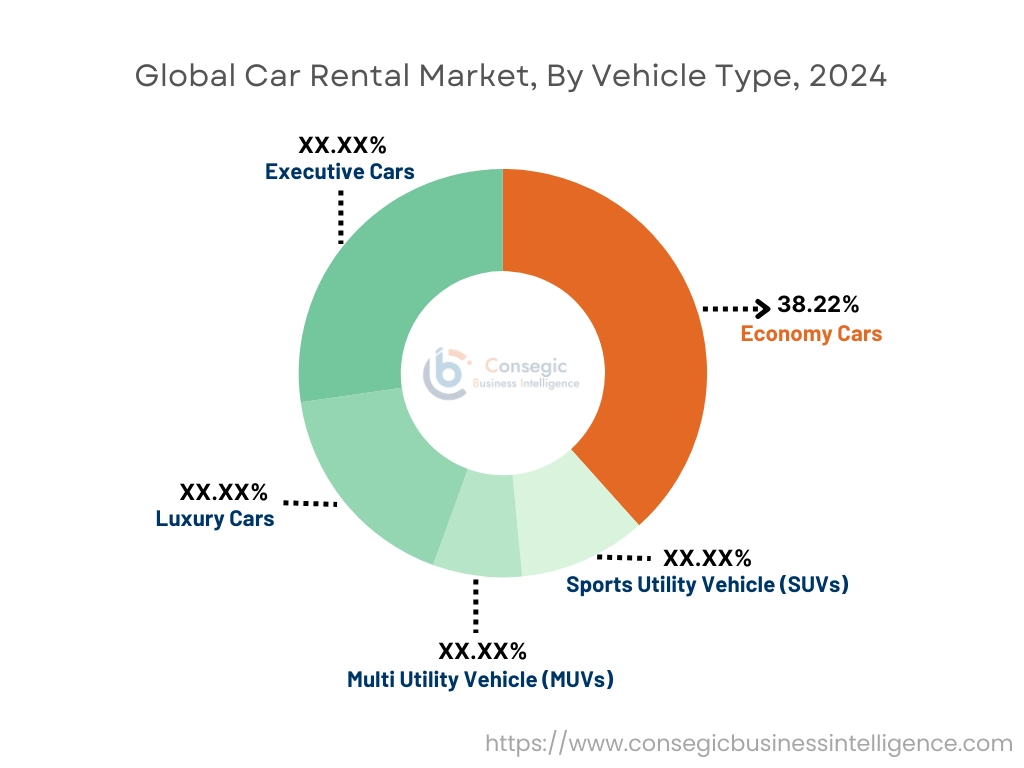
By Application:
Based on the application, the market is segmented into local usage, airport transport, outstation, and others.
Trends in the application:
- Factors including growing demand for economical mode of short-term transportation and attractive rental packages for tourists are among the primary factors driving the adoption of rental services for local usage applications.
- Increasing adoption of car renting services for airport transport and outstation applications due to its cost-efficiency and increased convenience.
Local usage segment accounted for a significant revenue share in the total market in 2024, and it is anticipated to register a substantial CAGR growth during the forecast period.
- Local usage segment includes car rentals by individual and family travellers who rent cars for vacations, weekend trips, sightseeing, or other recreational activities.
- Moreover, the rising interest in economical travel options is driving the adoption of cars renting services for local usage applications.
- For instance, Zoomcar Ltd provides a broad range of cars for rental purpose in its rental fleet offerings across several cities in India. The cars can be rented for multiple applications including local usage, leisure and travel activities.
- According to the analysis, the rising utilization of car renting services for local usage applications is driving the car rental market trends.
Regional Analysis:
The regions covered are North America, Europe, Asia Pacific, the Middle East and Africa, and Latin America.
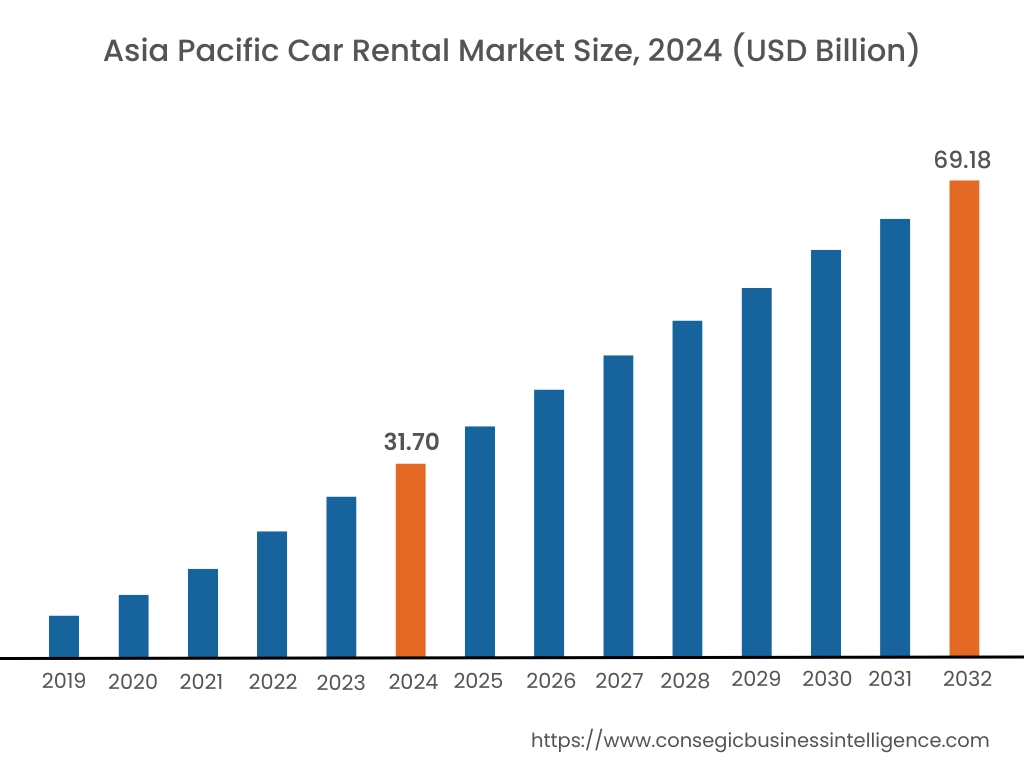
Asia Pacific region was valued at USD 31.70 Billion in 2024. Moreover, it is projected to grow by USD 34.33 Billion in 2025 and reach over USD 69.18 Billion by 2032. Out of this, China accounted for the maximum revenue share of 30.95%. As per the car rental market analysis, the adoption of car rental service in the Asia-Pacific region is primarily driven by the increasing need for economical transport solutions along with rising tourism & travel activities among others. Additionally, the rising tourism activities is driving the adoption of car renting services to provide convenient travel options for tourists and travelers to explore new destinations, which is further accelerating the car rental market expansion.
- For instance, according to the Singapore Tourism Board, Singapore witnessed approximately 6 million foreign tourists in 2023, witnessing a substantial incline of over 100% from 6.3 million visitors in 2022.
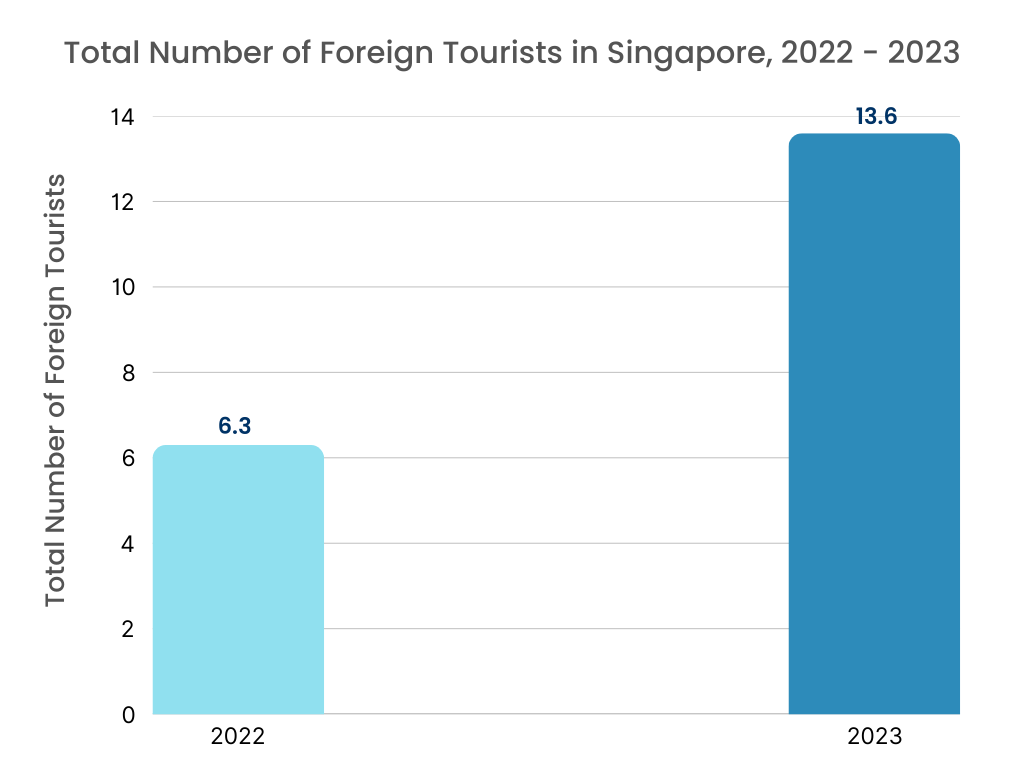
The above factors are driving the adoption of car renting services for facilitating convenient travel options for tourists and travelers, in turn propelling the market in the Asia-Pacific region.

North America is estimated to reach over USD 107.56 Billion by 2032 from a value of USD 51.76 Billion in 2024 and is projected to grow by USD 55.83 Billion in 2025. In North America, the growth of car rental industry is driven by the growing investments in sustainable transportation industry and presence of multiple car rental companies among others. Moreover, the presence of a large number of corporate infrastructures in North America has encouraged businesses to rent vehicles for its employees in terms of their daily commute to work, which is further contributing to the car rental market demand.
Additionally, the regional analysis depicts that prevalence of favorable government measures and initiatives for eco-friendly mobility solutions and rising consumer preference for affordable transport solutions are driving the car rental market demand in Europe. Furthermore, as per the market analysis, the market growth in Latin America, Middle East, and African regions is expected to grow at a considerable rate due to factors such as growing advancements in car renting service offerings and increasing need for economical transport solutions among others.
Top Key Players & Market Share Insights:
The global car rental market is highly competitive with major players providing services to the national and international markets. Key players are adopting several strategies in research and development (R&D), product innovation, and end-user launches to hold a strong position in the car rental market. Key players in the car rental industry include-
- The Hertz Corporation (U.S)
- Enterprise Holdings Inc. (U.S)
- ECO Mobility (India)
- Carzonrent India Private Limited (India)
- Zoomcar (India)
- Avis Budget Group, Inc. (U.S)
- Easirent (U.S)
- Sixt SE (Germany)
- Localiza (Brazil)
- Europcar (France)
Recent Industry Developments :
Business Expansion:
- In January 2025, SIXT USA launched its latest location at Louis Armstrong New Orleans International Airport in the U.S, which is the company’s first branch in Louisiana. This further expands the SIXT’s presence to 51 airports in the U.S. along with presence in over 100 locations across 26 states.
Service Launch:
- In December 2024, Zoomcar Holdings Inc. launched Zoomcar Cabs in Bengaluru, India, which provides commercial cars with professional drivers for rental at ideal prices.
Partnerships & Collaborations:
- In January 2023, Hertz announced a new partnership initiative, Hertz Electrifies, which the aim of transforming the rental car industry and driving mainstream consumer adoption of electric vehicles.
Car Rental Market Report Insights:
| Report Attributes | Report Details |
| Study Timeline | 2019-2032 |
| Market Size in 2032 | USD 289.70 Billion |
| CAGR (2025-2032) | 10.7% |
| By Booking |
|
| By Rental Duration Type |
|
| By Vehicle Type |
|
| By Application |
|
| By Region |
|
| Key Players |
|
| North America | U.S. Canada Mexico |
| Europe | U.K. Germany France Spain Italy Russia Benelux Rest of Europe |
| APAC | China South Korea Japan India Australia ASEAN Rest of Asia-Pacific |
| Middle East and Africa | GCC Turkey South Africa Rest of MEA |
| LATAM | Brazil Argentina Chile Rest of LATAM |
| Report Coverage |
|
Key Questions Answered in the Report
How big is the car rental market? +
The car rental market was valued at USD 138.27 Billion in 2024 and is projected to grow to USD 289.70 Billion by 2032.
Which is the fastest-growing region in the car rental market? +
Asia-Pacific is the region experiencing the most rapid growth in the car rental market.
What specific segmentation details are covered in the car rentals report? +
The car rentals report includes specific segmentation details for booking, rental duration type, vehicle type, application, and region.
Who are the major players in the car rental market? +
The key participants in the car rental market are The Hertz Corporation (U.S), Enterprise Holdings Inc. (U.S), Avis Budget Group, Inc. (U.S), Easirent (U.S), Sixt SE (Germany), Localiza (Brazil), Europcar (France), ECO Mobility (India), Carzonrent India Private Limited (India), Zoomcar (India), and others.
